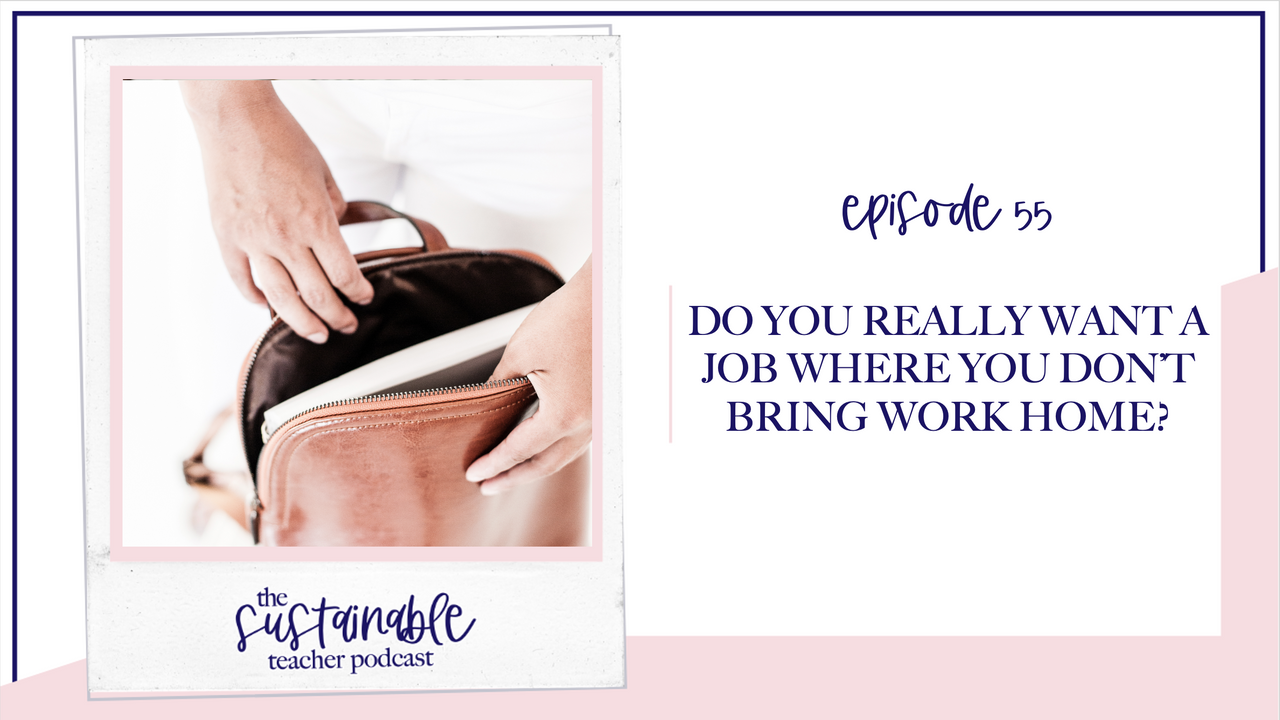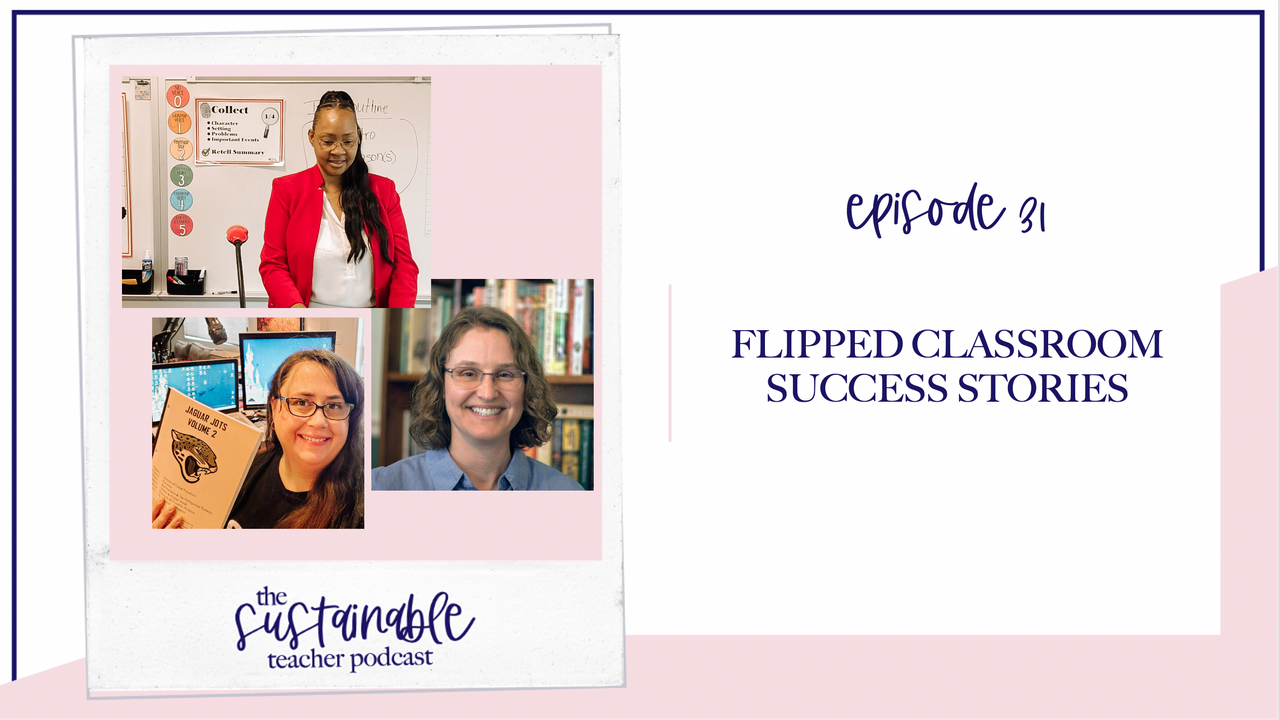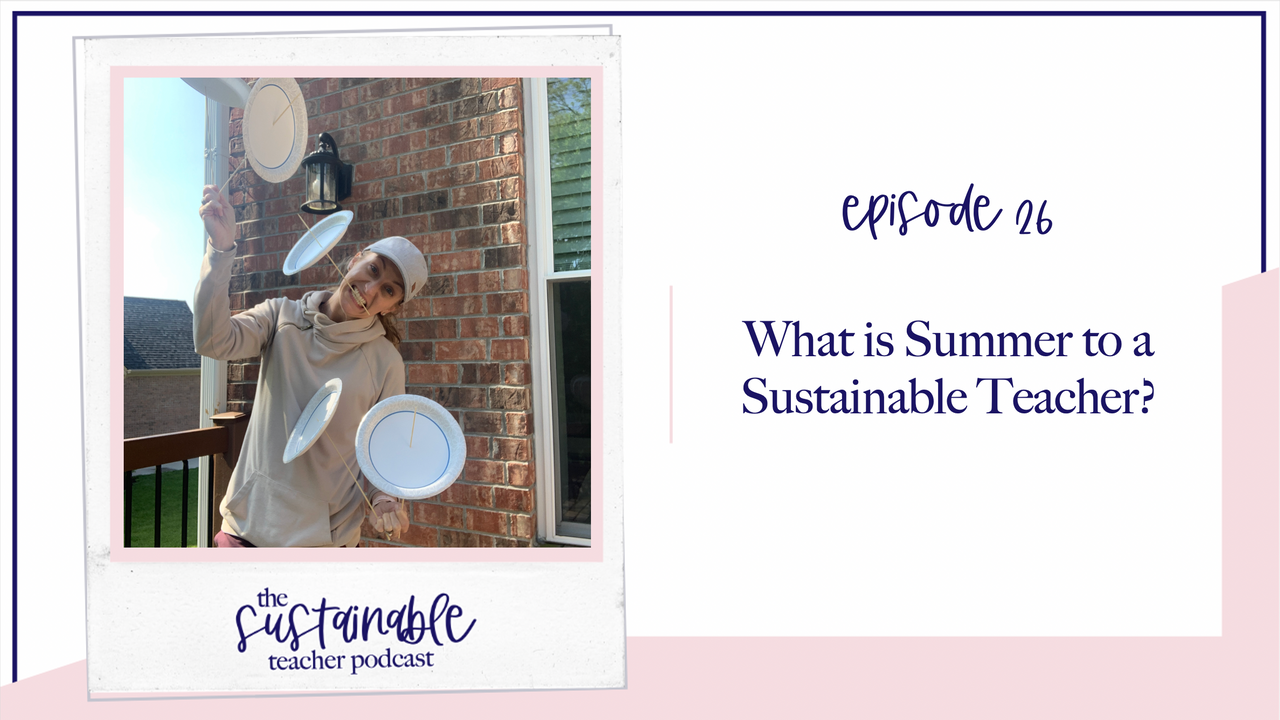Do You Really Want A Job You Don't Have To Take Home?

As I’m sitting to write this episode, I’m in an approximately six square feet space in the cab of our pick up truck pulling our camper on our way home from our Christmas vacation with three boys and our dog. I’m reflecting on what was by far our best camper-trip yet as it was at the beginning of winter and was full of sunshine which we Midwesterners aren’t used to in December.
It was a great refresh.
But you know what I thought about quite a bit? Work.
Not in a way that was stifling to my or our enjoying the trip. Not at all. We just had a lot of relaxation time. And that meant my mind was able to wonder and think and plan.
And it reminded me of how I was with my classroom when on a break or vacation.
When I was able to step back from it, I was able to think about it in a clearer way. I was able to work on my classroom rather than in my classroom.
Today I’m asking you the question, in a very non-rhetorical way, do you really want a job you don’t have to take home, becaus...
Teacher Tech Series Part Four: 3 Tips to Clean up Email

Kids have just left your room, you grab your lunch from the fridge and decide to have a working lunch (because, yes, those are ok to have every once in a while) in the peace and quiet of your empty classroom, and as you sit down and open your laptop, you immediately lose all semblance of peace and quiet when you open your email to find 15 new emails amid your inbox that already has over 200 messages needing your attention.
Among those emails are no less than a few reminding you of past emails you have not responded to yet, and there goes your peaceful and lite working lunch.
Much like we talked about in last week’s episode referring to project management and all the roles we fill as teachers, we are filling the position of around 5 people. It’s high time we start acting like someone who fulfills 5 positions by using a project management tool, and by streamlining how we handle our email inbox.
After listening to this episode you’ll be ready to tackle what is possibly the most tri...
Teacher Tech Series Part One: Parent Communication

Welcome back to the Sustainable Teacher, I hope your week so far is going as smoothly as possible, and that you have found this episode at just the right time, whenever that time might be for you. This episode will be a conversation about EdTech, but more so on the technology that is teacher-facing, and less student-facing.
Oftentimes in conversation and professional development involving educational technology, the focus is on student-facing technology and what newest tool can be used to have impact in your lessons. Although It's not bad that this is the main focus, it’s not the only way that technology can benefit a teacher and a classroom. So in this episode we’ll be talking about teacher tech and how to leverage technology to make a part of your day more sustainable, and the part of your day we’ll focus on in this episode is parent communication.
Sure, technology, in most areas, is great. It improves efficiency and even sustainability, but only if those are our intention...
3 Things at Home I'm Reevaluating this Back to School Season

Welcome back to the Sustainable Teacher Podcast, I’m so excited you are joining us today and want to remind you that if you’re loving the podcast and all that we offer here on this platform, it would help us out a ton if you could rate and review the podcast. It’s really easy to do right on the podcast app where you’re listening from, will take just a few seconds, and will ultimately help us reach more teachers with our message of sustainability.
Ok, let’s talk about today’s episode shall we.
Today I am sharing with you three things that I am reevaluating during this back to school season. We teachers are lucky in that we really have two times throughout the year where we get a fresh start. At the new year that is the calendar year, and at the new year that is the school year.
And so I am taking this opportunity to make sure that all systems are a go, and that there’s not anything that’s dragging us down as we each are working towards a thriving and fulfilling life.
We’re goi...
Honoring Student Voice is Easier Than You Think with Monica Burns

Well hello there teacher-friend and welcome back to the Sustainable Teacher Podcast where we talk about all things sustaining daily teacher-life so we don’t have to spend our evenings and weekends working, and yet are still effective in the classroom.
Today I am excited to welcome Dr. Monica Burns of Classtechtips.com onto the podcast. Monica is a former New York City teacher and edtech expert that is now sharing her edtech expertise with schools and teachers around the world. Her focus, both on her Easy EdTech Podcast and many publications, is to infuse technology for engagement and differentiation in order to simplify and streamline the technology integration process.
Monica is here today to talk about student voice and creativity, and how technology can help us elevate both of those important aspects of our classrooms, particularly in the flipped classroom.
I just know you will leave today’s episode with some great ideas and maybe even a new tool to try but not because the to...
Being a Principal and Spouse to a Sustainable Teacher

Hey teacher-friend, welcome back to the Sustainable Teacher, I’m so glad you decided to tune in today, and oh boy do I have an episode for you. In this episode I am introducing you to none other than my main-man and husband, Dr. Bill Rice.
I’m excited to bring him on not just because he’s my husband but also because he is an administrator - he is a high school principal at a school about 15 minutes down the road from us, and today he is offering a wonderful perspective. Well, two perspectives actually, on what it is to be a sustainable teacher, and that is from a principal’s role and the role of a teacher’s spouse.
My goal in interviewing Bill is not so that we can say, “see this is what you should be doing” to either our principals or our spouses, but so that teachers can see that your sustainability is what’s most important, next to being effective with kids, and that the classroom atmosphere and overarching learning experience you build for your students is more important than...
Teachers Aren't Teachers

Have you ever heard the phrase that the best way to learn something is to teach it? Or have you ever, instead of you, yourself teaching a concept, had your students take over to teach it because you knew they would have to learn it first?
You’ve experienced this yourself. The only way to be able to teach something is to learn it first. And this is why teaching can be so hectic, especially if you’re told you’re teaching a new subject or course within your certification. First you have to learn it, then you have to get into the complexities of best practices in teaching that specific content. Talk about time consuming, right?
But what if it didn’t have to be that complicated?
What if we approached it not as a teacher, but instead as expert learners?
In this episode I’m diving into how teachers are not teachers, they are expert learners of their specific content, because gone are the days where you can just talk at kids and expect them to absorb everything you say. Kids just d...
Flipped Classroom Success Stories

Brenda in 4th grade, Keri in 7th grade math, Jessica in high school chemistry, Megan in Algebra 2, and Charles in high school ELA… all are teachers who flipped their classrooms this past school year and are now on the other side of their hard work reaping the rewards of the flipped model and ready to share their own and their student success with you.
I’m compiling experiences into this one episode and hope that the stories shared allow you to see the possibilities for your own classroom and daily teaching life.
After listening to this episode you’ll be inspired by the success teachers of the flipped classroom have found, and see yourself in their transformation, knowing that this time next year, your classroom or student success story will be told.
Let’s get to it.

Before we get started I want to point you to a resource that I think you’ll love seeing and that is all of the stories I’m going to be sharing with you today and WAY MORE are available to you and anyone else who wan...
The End Game of a Sustainable Teacher

Hi teacher-friend, I am Mandy Rice, if you don’t know me, I am the host of this podcast that I hope you’ve come to enjoy on your commute or maybe are brand-new to, and I’m glad you’re here to hear me out on this episode. So, like I said, Hi, I’m Mandy, and I am control freak. I am also a work horse, and am productivity obsessed.
Now, I’m sharing these things about myself because maybe you can relate, especially in your career and daily teacher-life, but also because I want you to know that as much as I preach streamline, reduce, fight for your own sustainability, I want you to know that when I say these things, I’m also speaking directly to myself.
Working for your own sustainability is a journey, not a destination. Meaning we will never arrive at one place where we look around and realize, “Ok, yes, my daily life is sustainable now.” I don’t know, maybe we will, but I for sure know that if we can say that to ourselves, we won’t last if we don’t continually do the work to prio...
What Is Summer to a Sustainable Teacher?

I have an analogy for you that will take us through the duration of this episode. Here it is. Throughout the school year, we each have multiple spinning plates in the air as teachers and as human beings. Each facet of our life is one spinning plate, and it’s our job to keep them spinning and in the air lest they drop and shatter.
Summer break, then, is a time for us to put down all the educational, teachery plates we keep spinning for 9-10 months of the year so that we can focus on other plates. Summer is an incredible thing for teachers - this is no news to you - but truly, it is time for us to refuel and rejuvenate in whatever aspect of our life we want.
In this episode I’d like to offer some food for thought on how we can use summer to fuel our sustainability throughout the year. Hence the title What is Summer to a Sustainable Teacher. So stick around areas within this topic that we’ll be pondering and discussing today, and if it’s an episode and a message that you’re lo...


